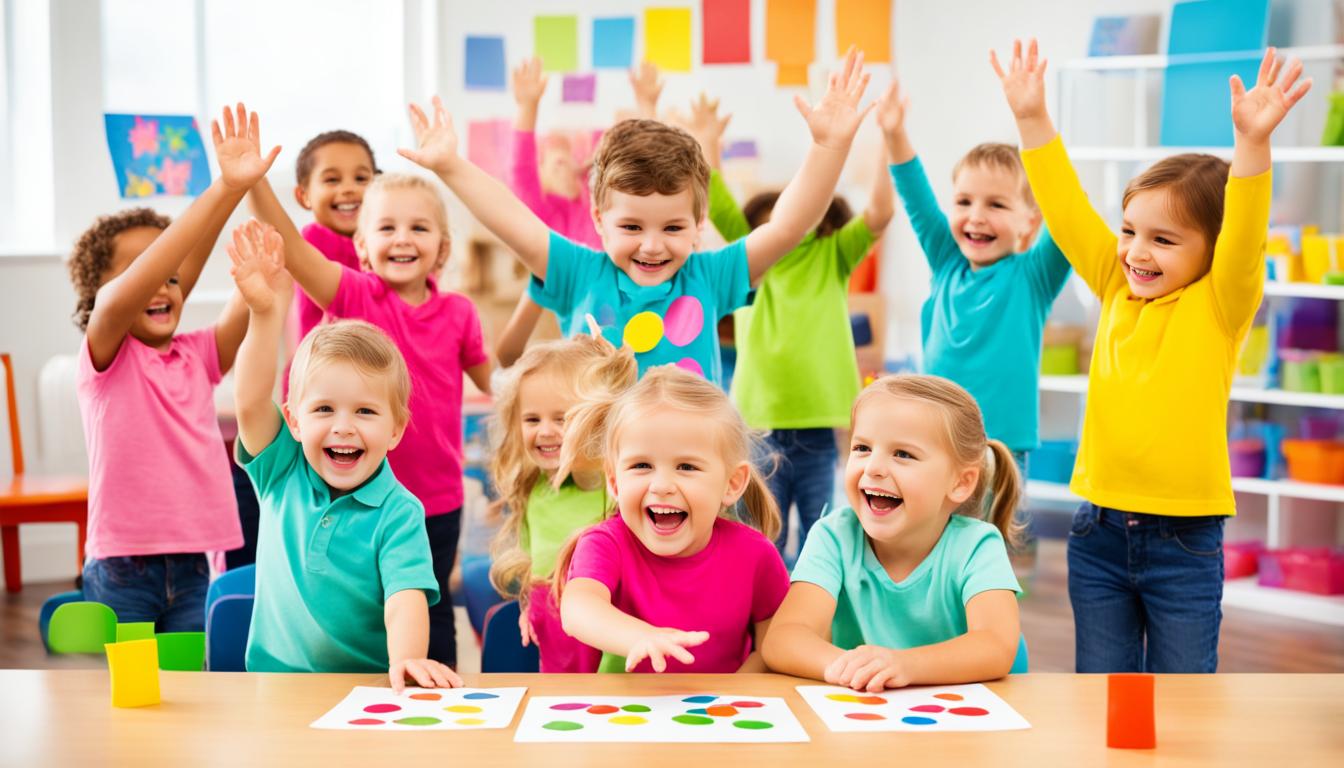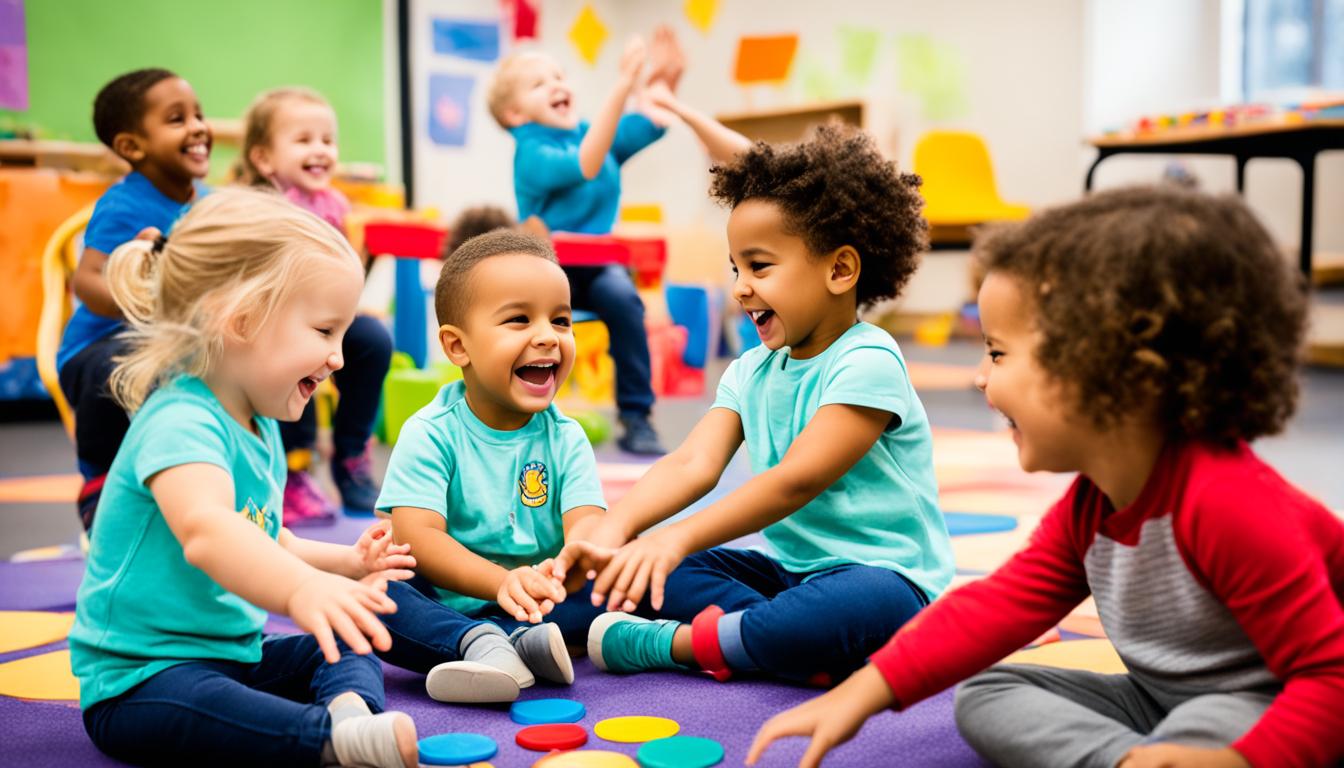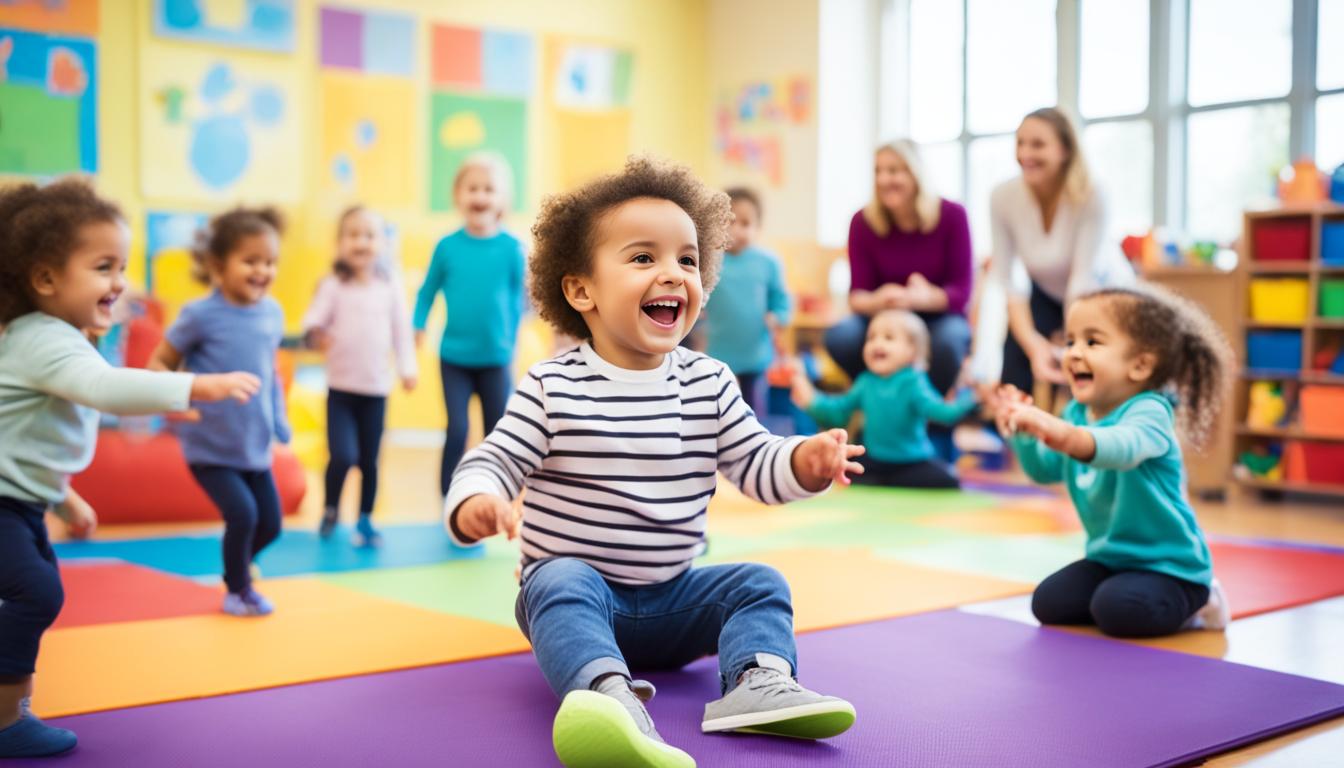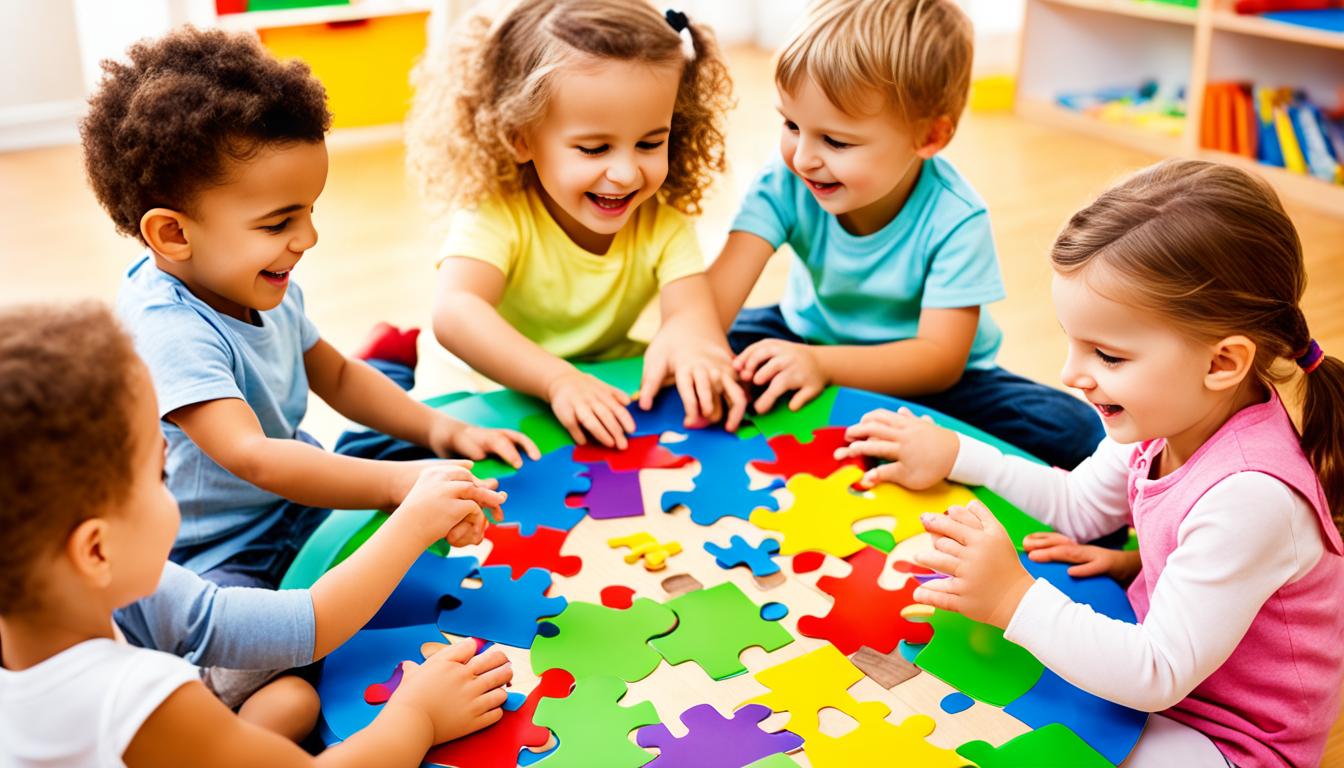Many parents and educators are concerned about the impact of social distancing on young children’s social skills. To help preschoolers develop strong friendships, it is important to provide them with opportunities to learn and practice social skills. This article will explore a variety of engaging friendship activities for preschoolers that can foster bonds and promote social development.
Key Takeaways:
- Engaging in friendship activities helps preschoolers develop social skills and build bonds.
- Providing opportunities for preschoolers to learn and practice social skills is crucial for their social development.
- Friendship activities can be incorporated into daily classroom activities to promote friendship skills.
- Small group and partner activities provide focused settings for preschoolers to practice friendship skills.
- Children needing more support can benefit from individualized strategies to learn and practice friendship skills.
Building strong friendships is essential for preschoolers’ social and emotional development. By engaging in friendship activities and providing teaching strategies and support, educators and parents can foster positive social interactions and help preschoolers develop meaningful friendships that will benefit them throughout their lives.
Universal Strategies for Teaching Friendship Skills
Building strong friendships is an important aspect of a preschooler’s social development. Incorporating universal strategies into daily classroom activities can help promote friendship skills in an engaging and effective way. Here are some easy friendship activities for preschoolers that focus on social skill building:
“Creating friendship connections through activities such as using a board with photos of classmates.” Displaying photos of classmates on a board can help preschoolers familiarize themselves with their peers and create a sense of connection. It allows children to visually recognize and remember their classmates’ faces, facilitating the development of friendships.
“Modeling friendship skills during interactions.” As an educator or parent, you can role model positive social behaviors and friendship skills during your interactions with the preschoolers. Demonstrating effective communication, sharing, and cooperation can help children understand how to build and maintain friendships.
“Reading friendship-themed books and engaging in discussions.” Reading books that highlight friendship themes and engaging in discussions about the stories can provide valuable opportunities for preschoolers to learn about empathy, kindness, and what it means to be a good friend. It also encourages children to reflect on their own experiences and feelings.
“Role-playing friendship scenarios.” Role-playing allows preschoolers to practice different friendship scenarios and learn problem-solving skills. Encourage children to take turns acting out different roles in scenarios like sharing toys, resolving conflicts, or inviting others to play. This activity helps them understand different perspectives and develop effective strategies for building and maintaining friendships.
“Using puppets to demonstrate and practice friendship skills.” Puppets can be powerful tools for teaching and practicing social skills. Encourage preschoolers to use puppets to act out friendship scenarios, express their feelings, and communicate with others. This playful activity helps develop communication skills and fosters empathy and understanding among children.
By incorporating these easy friendship activities for preschoolers, educators and parents can create a nurturing environment that promotes social skill development and cultivates strong friendships. Remember, building friendships is an important lifelong skill, and starting early helps set the foundation for positive social interactions.
// Insert image here
Strategies for Small Group and Partner Activities
Small group and partner activities are valuable opportunities for young children to practice and develop their friendship skills in a more focused setting. These engaging activities can foster teamwork, cooperation, and positive peer interactions.
One effective approach is to incorporate cooperative activities where children work together towards a common goal. This not only promotes teamwork, but also encourages children to communicate, problem-solve, and compromise. For example, you can organize a friendship-themed scavenger hunt where children work in pairs or small groups to find and collect hidden treasures. This activity promotes collaboration and encourages children to support and rely on each other, strengthening their bonds of friendship.
Peer-mediated interventions can also be beneficial in building social connections among preschoolers. By pairing children as “peer buddies,” they can learn and practice friendship skills together. For instance, you can assign older children in the class as buddies to younger children, guiding them in activities that promote sharing, taking turns, and actively listening to one another. Not only does this provide an opportunity for older children to develop leadership skills, but it also fosters a sense of belonging and friendship for both partners.
Incorporating friendship-themed games and songs into the daily routine can also enhance social interactions and promote friendship. Non-competitive games such as “Simon Says,” “Duck Duck Goose,” or “Musical Chairs” encourage children to take turns, follow rules, and interact with their peers in a fun and engaging way. Sing-along songs with lyrics about friendship and cooperation, such as “You’ve Got a Friend in Me” or “We’re All in This Together,” can create a positive and inclusive atmosphere where children feel connected and supported.
Remember, small group and partner activities provide valuable opportunities for preschoolers to develop and practice their friendship skills. By incorporating cooperative activities, peer-mediated interventions, and friendship-themed games, you can create an environment that fosters positive social interactions and helps children form strong and meaningful friendships.

Individualized Strategies for Children Needing More Support
Every child develops at their own pace and may have different needs when it comes to building friendships. For some preschoolers, more individualized instruction and support may be necessary to help them learn and practice important friendship skills. Here are some strategies that can be beneficial:
Social Stories and Play Scripts
Using social stories and play scripts can be an effective way to teach children about friendship skills and appropriate behaviors. By presenting social situations and interactions in a story format, children can better understand how to navigate social relationships. These stories can be created specifically for each child to address their unique challenges and learning styles. Play scripts can also provide opportunities for children to practice social scenarios through imaginative play.

Priming with Visual Cues and Prompts
Priming involves providing visual cues and prompts to help children prepare for social interactions. These visual supports can include pictures, reminders, or step-by-step guides that prompt children to use specific friendship skills. For example, a visual cue could be a picture of a child sharing a toy with a friend, reminding the child to take turns and share during playtime. By using priming strategies, children can better understand and remember the appropriate social behaviors they need for successful friendships.
Visual Supports Focused on Friendship Skills
Complex friendship skills can sometimes be challenging for children to grasp. By breaking down these skills into manageable parts using visual supports, children can more easily understand and practice them. Visual supports can include charts, posters, or flashcards that illustrate different friendship skills, such as listening, taking turns, and showing empathy. These visual aids serve as a reference and reminder for children as they navigate social interactions and develop their friendship abilities.
Monitoring Center Time and Providing Embedded Friendship Opportunities
Children often engage in independent play or activities during center time. By monitoring and guiding their play, educators can create opportunities for friendship building. For example, an educator can set up a specific activity or center that encourages cooperation and collaboration, such as a building block station or a puppet theater. This allows children to naturally interact with and connect with their peers, fostering friendship development in a supportive and structured environment.
By implementing these individualized strategies, educators and parents can provide the necessary support for preschoolers who may need extra assistance in developing friendship skills. Remember, every child is unique, and it is important to tailor these strategies to meet their specific needs.
Preschoolers Making Friends: What to Expect
As your preschooler grows and develops, they will begin to engage in activities with other children and form friendships. By the age of 3, many preschoolers start to have a clear idea of who their friends are. By the age of 4, most children can differentiate between their friends and other acquaintances. It’s a natural part of their social development, but every child is different.
Some preschoolers may have no trouble making friends and may naturally gravitate towards social interactions. They may easily join in with groups and initiate play with their peers. These children are often outgoing and confident in social situations.
On the other hand, some preschoolers may need more time to warm up and feel comfortable in social settings. They may be more reserved or shy, which can make it harder for them to approach others and form friendships. These children may prefer to observe and watch others before actively participating.
It’s important to remember that every child develops at their own pace, and their approach to making friends can vary. Some preschoolers may have a wide circle of friends, while others may have a smaller group of close friends. Both scenarios are completely normal.
Encourage your preschooler to engage in social activities, such as playdates or group outings, where they can interact with other children. By providing opportunities for socialization, you can support their friendship-building skills and help them develop meaningful connections.
Helpful Tip
Observe your child’s interactions with others and provide gentle guidance when needed. Encourage them to share, take turns, and listen to their friends. By demonstrating and reinforcing positive social behaviors, you can help your preschooler navigate social situations more confidently.

Understanding what to expect as your preschooler makes friends can provide valuable insight into their social development. Remember to be patient and supportive as they navigate their friendships. With time and practice, they will continue to grow and form lasting bonds with their peers.
Conclusion
Building strong friendships is essential for preschoolers’ social and emotional development. By engaging in fun activities to teach friendship in preschool and providing teaching strategies and support, educators and parents can help preschoolers learn and practice friendship skills.
Creating a supportive and inclusive environment is crucial in fostering positive social interactions among preschoolers. Through preschool friendship activities, such as collaborative games, art projects, and role-playing scenarios, children can develop meaningful friendships that will benefit them throughout their lives.
By incorporating friendship activities into the daily routine, preschoolers can learn important skills like empathy, communication, and cooperation. These activities provide opportunities for children to understand the value of friendship, resolve conflicts, and build trust with their peers.
By investing time and effort into teaching friendship skills in preschool, educators and parents can lay the foundation for strong social relationships that will contribute to children’s overall well-being and future success.
FAQ
How can friendship activities benefit preschoolers?
Friendship activities for preschoolers can help them develop social skills, foster bonds with classmates, and promote social and emotional development.
What are some universal strategies for teaching friendship skills?
Universal strategies include using a board with photos of classmates, modeling friendship skills, reading friendship-themed books, role-playing friendship scenarios, and using puppets to demonstrate and practice friendship skills.
How can small group and partner activities promote friendship?
Small group and partner activities, such as cooperative games and peer-mediated interventions, provide opportunities for preschoolers to practice teamwork, cooperation, and social skills in a focused setting.
How can individualized strategies support children needing more friendship support?
Individualized strategies, such as social stories, play scripts, priming, visual cues, and monitoring center time, can help children learn about friendship skills and practice appropriate behaviors.
What can parents and educators expect when it comes to preschoolers making friends?
By the age of 3, many preschoolers start engaging in activities with other children and may have a clear idea of who their friends are. By the age of 4, most children can differentiate between their friends and other acquaintances.
How can preschools enhance friendship-building activities?
Preschools can create a supportive and inclusive environment, engage in fun activities, and provide teaching strategies and support to help preschoolers learn and practice friendship skills.
Source Links
- https://www.teachingexpertise.com/classroom-ideas/preschool-activities-about-friendship-2/
- https://blog.brookespublishing.com/14-great-friendship-supports-for-early-childhood-classrooms/
- https://raisingchildren.net.au/preschoolers/behaviour/friends-siblings/preschoolers-making-friends


